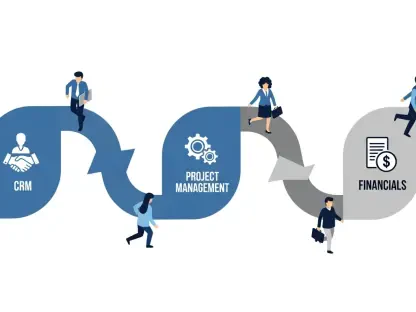Understanding the DevSecOps Landscape
The DevSecOps industry stands as a cornerstone of modern software development, with enterprises increasingly prioritizing the seamless integration of development, security, and operations. This approach has become essential as organizations strive to accelerate delivery cycles while maintaining robust security protocols in an era of escalating cyber threats. The convergence of these disciplines addresses the urgent need for agility without compromising on safety, making DevSecOps a critical framework for businesses navigating digital transformation.
At the heart of this landscape are major players like GitLab, Microsoft, and Atlassian, each vying to shape the future of software pipelines. Technological advancements, particularly in artificial intelligence and cloud computing, have further intensified competition by enabling more automated, scalable, and secure solutions. These innovations are redefining how teams collaborate and deploy code, pushing companies to adapt swiftly to maintain relevance in a fast-evolving market.
Security and compliance have also taken center stage, driven by stringent regulations and the growing sophistication of cyber risks. Enterprises now demand tools that embed security at every stage of development, ensuring adherence to global standards while minimizing vulnerabilities. This shift underscores the importance of platforms that can balance speed with stringent oversight, a challenge that defines the current state of the industry.
GitLab’s Position and Performance in DevSecOps
Innovative Features and Product Differentiation
GitLab has carved a notable niche in the DevSecOps arena with its AI-native platform, particularly through features like GitLab Duo, which enhances automation in areas such as code review and vulnerability detection. This tool streamlines workflows by providing real-time insights, allowing developers to address issues before they escalate. Such capabilities resonate strongly with enterprises seeking to reduce manual overhead while bolstering their security posture.
Further strengthening its appeal, the upcoming Duo Agent Platform promises to revolutionize task execution across the development lifecycle by enabling autonomous operations. This focus on unified tools addresses the pressing demand for speed and efficiency, positioning GitLab as a comprehensive solution for complex enterprise needs. By prioritizing a single, cohesive environment, the platform minimizes fragmentation often seen in multi-tool setups.
Additionally, GitLab’s cloud-agnostic approach and integrations with leading AI and cloud providers like Google and Amazon offer unparalleled flexibility. This adaptability ensures that businesses can deploy solutions across diverse environments without being locked into a single ecosystem. Such strategic alignments enhance GitLab’s value proposition, catering to the varied infrastructure preferences of modern organizations.
Financial Growth and Enterprise Adoption Metrics
On the financial front, GitLab projects a fiscal third-quarter revenue of $238.61 million, marking a substantial 21.7% increase compared to the previous year. This growth trajectory reflects the market’s confidence in GitLab’s offerings and its ability to capture a larger share of the DevSecOps space. Sustained revenue expansion signals a robust foundation for future investments in innovation.
Customer metrics further highlight GitLab’s enterprise traction, with a 20% rise in clients generating over $100,000 in annual recurring revenue, totaling 1,372 customers. This uptick demonstrates the platform’s appeal to larger organizations with complex requirements. Moreover, a dollar-based net retention rate of 120% underscores strong customer loyalty and expansion within existing accounts, a critical indicator of long-term viability.
Looking ahead, GitLab’s ability to sustain this momentum appears promising, provided it continues to address evolving market demands. The combination of financial health and customer growth suggests a capacity to invest in cutting-edge features while scaling operations. However, maintaining this pace will require vigilant adaptation to competitive and technological shifts.
Competitive Challenges Facing GitLab
The competitive landscape in DevSecOps presents formidable hurdles for GitLab, with Microsoft emerging as a dominant rival through its integrated GitHub and Azure DevOps ecosystem. Microsoft’s advanced security features, such as GitHub Advanced Security, provide a compelling offering for enterprises already embedded in the Azure environment. This deep integration creates a seamless experience that can be difficult for standalone platforms to replicate.
Atlassian also poses a significant challenge, leveraging tools like Jira and Bitbucket to build a strong presence in the market. Through initiatives like Open DevOps, Atlassian enhances security visibility by integrating third-party solutions from providers such as Snyk and JFrog. This workflow-centric approach appeals to teams prioritizing customization and interoperability, potentially drawing users away from GitLab’s unified model.
To counter these pressures, GitLab must focus on continuous innovation, particularly in areas where competitors’ ecosystem strengths overshadow its single-platform strategy. Enhancing unique differentiators, such as AI-driven automation, could help maintain its edge. Additionally, expanding partnerships and integrations may address gaps in flexibility, ensuring relevance in a market driven by diverse enterprise needs.
Regulatory and Security Considerations in DevSecOps
Navigating the regulatory landscape remains a critical aspect of DevSecOps, with data privacy laws and compliance mandates shaping platform requirements. Regulations like GDPR and CCPA impose strict guidelines on how data is handled within development pipelines, compelling companies to prioritize tools that ensure adherence. This environment demands solutions that can seamlessly integrate compliance into everyday processes.
Security integration within development tools has become non-negotiable as enterprises face heightened scrutiny over vulnerabilities. Platforms must offer robust features to detect and mitigate risks at every stage, from code creation to deployment. GitLab and its competitors are responding by embedding advanced security capabilities, ensuring that their offerings align with the stringent expectations of regulated industries.
The broader implications of these regulatory shifts influence adoption trends, as businesses gravitate toward platforms that simplify compliance burdens. Innovations focused on audit trails, encryption, and policy enforcement are becoming standard expectations. As these demands evolve, companies that proactively address them will likely gain a competitive advantage in securing enterprise trust.
Future Trends and Opportunities in DevSecOps
The DevSecOps sector is witnessing a surge in demand for AI-enhanced, integrated platforms as enterprises increasingly adopt AI-assisted development practices. This trend reflects a broader shift toward automation, where tools that streamline coding, testing, and deployment gain prominence. Companies that harness these capabilities stand to benefit from heightened efficiency and reduced time-to-market.
Emerging technologies and changing enterprise preferences also present potential disruptions, with a growing inclination toward unified tools over fragmented solutions. This shift challenges providers to offer end-to-end platforms that minimize complexity. GitLab’s emphasis on a cohesive environment aligns well with this direction, though staying ahead will require agility in adopting nascent innovations.
Global economic conditions and competitive dynamics further shape the industry’s trajectory, influencing investment in new features and market expansion. GitLab’s focus on AI automation and security positions it favorably to capitalize on these opportunities. By prioritizing scalable solutions that address both current and future needs, the company can solidify its role as a leader in this transformative space.
Conclusion: GitLab’s Path Forward
Reflecting on the analysis, GitLab demonstrates considerable strengths through its innovative platform and alignment with key industry trends like AI and security integration. Its financial performance, marked by significant revenue growth, and strong enterprise adoption metrics underscore a solid market position. Yet, the competitive pressures from giants like Microsoft and Atlassian highlight persistent challenges that demand attention.
To navigate the road ahead, GitLab needs to double down on scaling its technological advantages, particularly through advancements like the Duo Agent Platform, to stay ahead of rivals. Strategic partnerships and deeper integrations could further broaden its appeal, addressing the diverse needs of enterprises. Focusing on these areas promises to fortify its standing in a crowded field.
Beyond immediate tactics, GitLab must consider long-term adaptability to regulatory shifts and emerging technologies as pivotal to sustained success. Investing in features that preemptively tackle compliance and security concerns will build lasting trust with clients. By balancing innovation with strategic execution, GitLab can chart a resilient path through the evolving DevSecOps landscape.









